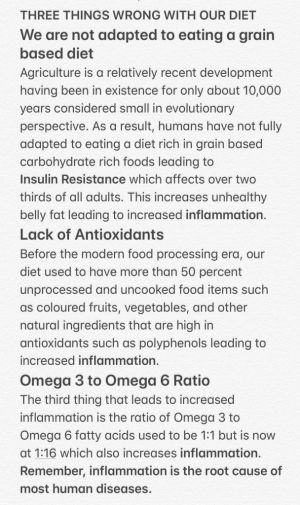3 things wrong with our diet
The words of Hippocrates, "Let food be thy medicine and medicine be thy food," ring truer now than ever before. The Centers for Disease Control and Prevention (CDC) reports that over one-third of adults (35.7%) are considered obese with a body mass index (BMI) of 30 or higher, and another third are overweight with a BMI between 25-30. This means that roughly 68% of Americans are either overweight or obese. Additionally, 17% of youth are considered obese. Obesity-related conditions, such as heart disease, stroke, type 2 diabetes, and certain cancers, are leading causes of preventable death. In 2008, the estimated medical costs associated with obesity were $147 billion, with the medical costs for those who are obese being $1,429 higher than those of normal weight.
The Evolution of the Human Diet
To understand the current obesity epidemic, it is important to take a look at the evolution of human diets. Humans originally evolved as hunters and gatherers, consuming diets rich in protein, fat, and unrefined carbohydrates from foods such as meat, eggs, nuts, fruits, and vegetables. Agriculture, the primary source of grain-based carbohydrates, has only been in existence for about 10,000 years, which is a relatively short period in evolutionary terms. As a result, humans have not fully adapted to diets high in grain-based carbohydrates.
The Modern Diet: Three Factors Contributing to Obesity
In my opinion, three significant changes to the modern diet have contributed to the obesity epidemic.
Insulin Resistance or Metabolic Syndrome
Insulin resistance or metabolic syndrome is the most important factor, affecting one in three Americans. This condition is believed to be a direct result of the incorrect message promoted by the food pyramid, which advocated for a grain-based diet and assumed that fat was the primary cause of weight gain. Despite a reduction in overall fat intake, the obesity epidemic has continued to rise. The reason for this is insulin resistance.
Insulin is the key hormone for glucose metabolism, fat gain and loss. After consuming carbohydrates, blood sugar levels increase and insulin works to push glucose into cells for energy or storage as fat. When cells are bombarded with too much simple sugar from carbohydrates (such as white breads, potatoes, sugary drinks, etc.), the insulin receptors that regulate blood sugar levels can malfunction and shut down. This leads to a cycle of increased insulin production and insulin resistance, making it difficult for the body to access its stored fat for energy. The more insulin resistant a person is, the more insulin the pancreas must produce, leading to body building in areas such as intra-abdominal and upper body fat. This fat accumulation is associated with metabolic syndrome and increased inflammation, which can increase the risk of cardiovascular disease, diabetes, and other health conditions.
Lack of Antioxidants
The second factor contributing to increased inflammation is the lack of polyphenols and other antioxidants in the modern diet. Prior to modern food processing, diets included more than 50% unprocessed and uncooked foods such as colored fruits and vegetables, which are high in antioxidants like polyphenols. Studies have shown that a lack of polyphenols can lead to increased inflammation in the body.
Omega 3 to Omega 6 Ratio
The third factor is the ratio of Omega 3 to Omega 6 fatty acids, which has shifted from 1:1 to 1:16, also leading to increased inflammation. This increase in inflammation can increase the risk of cardiovascular disease, diabetes, and certain types of cancer.
Nutrient dense foods - not calorie dense foods
In order to reduce the risk of obesity and associated health problems, it is important to adopt a diet that is nutrient-dense and low in added sugars and refined carbohydrates. This can include incorporating more whole, unprocessed foods such as fruits and vegetables, lean proteins, healthy fats, and whole grains. Additionally, reducing inflammation in the body through a balanced omega-3 to omega-6 ratio and increasing antioxidant intake can also be beneficial.
Portions matter
It is also important to be mindful of portion sizes and to engage in regular physical activity. This can help to improve overall health and reduce the risk of obesity and related diseases.
Role of physicians
The role of healthcare providers is crucial in addressing the obesity epidemic. By providing education, support, and evidence-based solutions, healthcare providers can help their patients to make positive changes and improve their health outcomes. It is time for healthcare providers to take a more proactive approach in addressing the issue of obesity and to work towards creating a healthier future for all.
Lack of obesity medicine education
Physicians should play a more proactive role in addressing the obesity epidemic by obtaining training and education in obesity medicine. Only a small percentage of physicians receive education in nutrition, leading to a lack of understanding of the factors that cause weight gain. A physician trained in obesity medicine can guide patients in reducing inflammation, losing weight, and living a healthy life.
Fighting the epidemic
The obesity epidemic in the United States and elsewhere is largely due to the modern diet, insulin resistance, lack of antioxidants, and imbalanced omega-3 to omega-6 fatty acids. To combat this epidemic, individuals must adopt healthier dietary habits and seek guidance from a physician trained in obesity medicine.
How can W8MD help?
A physician trained in Obesity Medicine can provide a comprehensive, personalized treatment plan to help patients reduce inflammation, lose weight, and live a healthy life.
Transform your life with W8MD's budget GLP1 injections from $50.00^
W8MD Weight Loss, Sleep & Medspa Centers is a network of medical centers located in New York, and Pennsylvania, that provide comprehensive care for weight loss, sleep disorders, and aesthetic treatments. We can obtain insurance prior authorizations when coverage available.
Book appointments
Locations
W8MD location(s):
- NYC weight loss: NYC medical weight loss, sleep and medspa: 2632 E 21st St., Suite L3, Brooklyn, NY 11235 Contact: (718)946-5500
- Philadelphia weight loss - 1718 Welsh Road, 2nd Floor, Ste C, Philadelphia, PA 19115 (215)676-2334
- W8MD's Weight loss diet - Recipes (WikiMD)
- Links: Weight loss | Sleep medicine | Medical spa | Nutrition | Success stories |
- Diet pills: Phentermine, Phen/Topiramate, Wegovy, Saxenda, Zepbound, Mounjaro, Contrave, Diethylpropion etc.
- Resources: W8MD diet | Keto diet guide | Free Ebook | 12 Ways to lose weight quickly | 8 Amazing Weeks
- Tags:NYC medical weight loss, Philadelphia lose weight, Zepbound NYC, Budget GLP1 weight loss injections, Wegovy Philadelphia, Wegovy NYC, Philadelphia medical weight loss, Brookly weight loss and Wegovy NYC
![]()
![]()
![]()
![]()
You can now request appointments by text for all existing patients! Simply send your name, date of birth, and preferred date, location & time to Havila at (718) 207-7411.
- ^ Our budget compounded Semaglutide starts from weekly from $50 and up and Tirzepatide from $65.00 and up weekly with insurance. Self pay patients add $50.00 weekly visit fee.
- The prices are for starting dose only and will go up based on the dose. Insurance copays, deductibles and program fees may apply! Individual results may vary.




